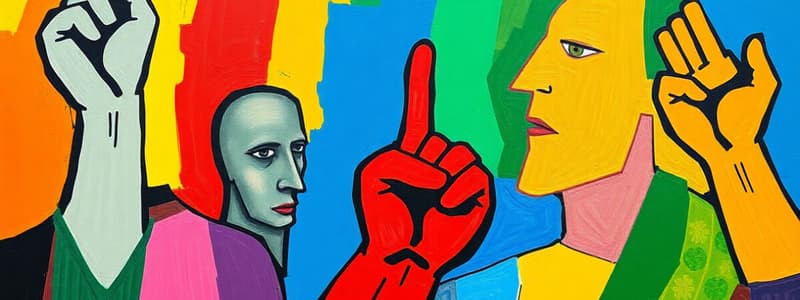Podcast
Questions and Answers
What event is commonly associated with the rise of the counterculture movement in the United States?
What event is commonly associated with the rise of the counterculture movement in the United States?
- Woodstock (correct)
- The Vietnam War
- Watergate Scandal
- Civil Rights Movement
Which event is directly linked to the Gay rights movement and is considered a catalyst for activism?
Which event is directly linked to the Gay rights movement and is considered a catalyst for activism?
- Kent State
- Roe v. Wade
- Woodstock
- Stonewall (correct)
What was the Southern strategy primarily aimed at during Nixon's presidency?
What was the Southern strategy primarily aimed at during Nixon's presidency?
- Winning over conservative white voters in the South (correct)
- Acquiring oil from OPEC
- Promoting civil rights legislation
- Increasing military presence in Vietnam
What was the main purpose of the War Powers Act passed in 1973?
What was the main purpose of the War Powers Act passed in 1973?
What significant event characterized the Iran Hostage Crisis under Jimmy Carter's administration?
What significant event characterized the Iran Hostage Crisis under Jimmy Carter's administration?
Flashcards
Vietnam War
Vietnam War
A protracted conflict in Vietnam, Laos, and Cambodia from the 1950s to the 1970s that involved the U.S. against communist forces.
Watergate Scandal
Watergate Scandal
A major political scandal that occurred in the United States in the 1970s, following a break-in at the Democratic National Committee headquarters at the Watergate Hotel in Washington, D.C.
Civil Rights Movement
Civil Rights Movement
A struggle for social justice that aimed to dismantle legal segregation, discrimination, and disenfranchisement of African Americans in the United States.
Stagflation
Stagflation
Signup and view all the flashcards
Roe v. Wade
Roe v. Wade
Signup and view all the flashcards
Study Notes
Counterculture
- A significant social and cultural movement characterized by a rejection of traditional values and norms.
Woodstock
- A pivotal music and arts festival that symbolized the counterculture movement.
Gay Rights Movement
- A social and political movement advocating for equal rights and recognition for LGBTQ+ individuals.
Stonewall
- A pivotal event in the gay rights movement, a series of spontaneous demonstrations by members of the LGBTQ+ community in response to a police raid.
Equal Rights Amendment (ERA)
- Proposed amendment to the US Constitution aimed at guaranteeing equal rights for all regardless of sex.
Roe v. Wade
- Landmark Supreme Court decision establishing a woman's right to an abortion.
Richard Nixon
- 37th President of the United States, known for policies like the Southern Strategy and détente.
Southern Strategy
- A political strategy employed by Nixon to appeal to white voters in the South, a section of the country that historically voted strongly Democratic.
Silent Majority
- Nixon's term for the segment of the population that supported his policies and were not directly involved in the antiwar or counterculture movements.
Stagflation
- The combination of slow economic growth (stagnation) and high inflation.
OPEC
- Organization of the Petroleum Exporting Countries, significantly impacted global oil markets and caused economic challenges including energy crises.
Détente
- A period of improved relations between the US and the Soviet Union with reduced tensions and increased communication.
Vietnam
- The Vietnam War, a protracted and controversial war involving the US and various groups in Vietnam.
My Lai
- A mass murder of unarmed civilians in South Vietnam by US troops during the war.
Vietnamization
- Nixon's policy of transferring the responsibility of the war to South Vietnamese forces.
“Search and Destroy”
- A military strategy in Vietnam involving efforts to locate and destroy enemy forces and their bases.
Body Counts
- Controversial statistics used to measure the efficacy and progress of the Vietnam War by counting enemy casualties.
Antiwar Movement
- A significant social movement opposing the Vietnam War.
Tet Offensive
- A series of surprise attacks by the Viet Cong and North Vietnamese forces during the Tet holiday.
Kent State
- A tragic event involving the shooting of unarmed students by National Guard soldiers in protest of US involvement in the war.
War Powers Act
- Legislation to limit the President's ability to deploy the US military without Congressional approval, as part of checks and balances in the US government.
Jimmy Carter
- 39th President of the United States, faced the Iran hostage crisis during his presidency.
Iran Hostage Crisis
- A major political crisis in the US, when Iranian students seized the US embassy in Tehran and held American diplomats hostage.
Studying That Suits You
Use AI to generate personalized quizzes and flashcards to suit your learning preferences.





